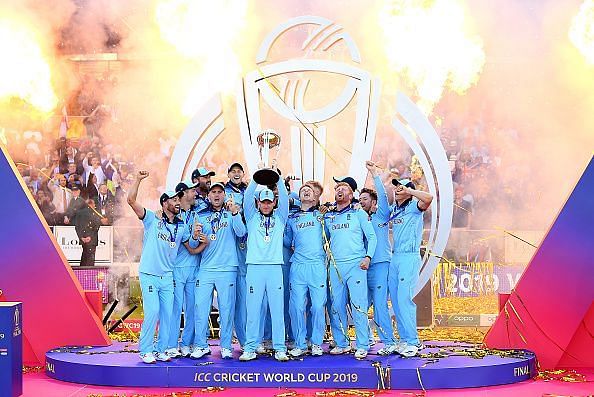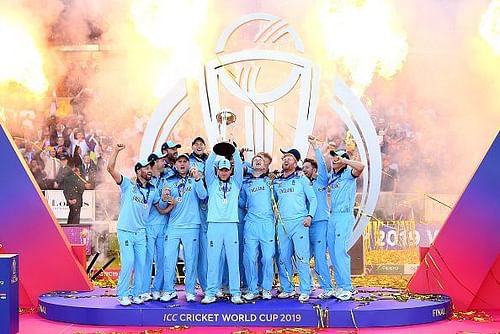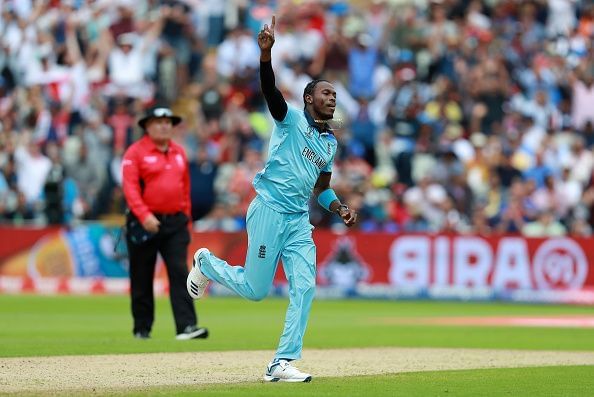
World Cup 2019 Review: England, the new champions

It seemed fitting that England faced New Zealand in the final at Lords, for it was the Black Caps who had destroyed the antiquated style of play that England possessed and forced them into developing a more aggressive and adventurous style in the mould of former New Zealand captain Brendon McCullum.
England did not have the easiest of journeys to the final in a tournament where everything could have gone south for them quickly. A defeat to Sri Lanka was thoroughly unexpected and a defeat to Australia during the group stage pushed them dangerously close to the brink of elimination.
Injuries plagued a host of their players such as Jason Roy and a couple of niggles to the likes of Jos Buttler, Ben Stokes also did them no good.
However, England rallied impressively to defeat India and New Zealand to qualify for the semi-finals, undoubtedly boosted by the return of Jason Roy, who came back to the fold after recovering from a hamstring injury.
Their best was yet to come at that point, and it did so in their mauling of Australia during the semi-final. Australia were painfully restricted to a meagre total with the bat as they struggled against some brilliant bowling from England and were then massacred by some savage batting from Jason Roy yet again.
Having made it to the final for the second consecutive time, the game against New Zealand could certainly be labeled as the greatest game in ODI cricket history. With a World Cup match going to a Super Over for the first time, it was going to take something special from the hosts to win the tournament.
Ultimately, it came down to boundary count - they hit 26 compared to New Zealand's 17 - which was a true reflection of how England added a facelift to their limited overs game since their fiasco of a performance at the 2015 Cricket World Cup.
It was their batting that led the way. Joe Root led with 556 runs (with 2 centuries and 3 half-centuries), followed by Jonny Bairstow (532 runs), Jason Roy (443 runs) and Ben Stokes (465 runs). Roy's presence in the team was crucial, owing to the rate at which he scored his runs and the solidarity that he provided at the top of the order alongside Jonny Bairstow.
Captain Eoin Morgan had two significant innings of note in his 371 runs. His half-century against South Africa at the start of the tournament and his record-breaking innings of 148 against Afghanistan, when he scored a record 17 sixes in a single innings.
Jos Buttler notched up one century and two half-centuries, incuding an important 60-ball 59 against New Zealand that helped England on their way to a 242-run chase. Ben Stokes was England's brightest spark, with 465 runs and 7 wickets to his credit.

England's bowling was their weak link when they entered this tournament and it ended up being one of their biggest strengths in this tournament. Jofra Archer, with his pace and bounce led the way with 20 wickets and formed a useful bowling partnership with Mark Wood, who had 18 wickets to show for his efforts.
At several points during the tournament, one of the two would bowl the fastest ball bowled at the tournament only for the other to bowl a faster ball, resulting in a friendly competitive challenge that the batsmen definitely did not enjoy.
Archer's Twitter feed was also the source of mirth and spookiness throughout the tournament, as his past tweets inadvertently detailed a series of events that occured at this tournament.
Apart from Archer and Wood, Liam Plunkett returned 11 wickets with all of those 11 wickets being crucial ones such as Virat Kohli at Edgaston during the group stage and Kane Williamson during the final. Chris Woakes bowled effectively with the new ball, picking up 16 wickets and returning one solid innings with the bat.
Adil Rashid managed a shoulder injury throughout the competition and returned 11 wickets, crucially taking the wickets of Marcus Stionis and Alex Carey in one over during the semi-final. Moeen Ali bowled tidily for his 5 wickets but a rash shot during a tense chase against Sri Lanka saw him dropped from the playing XI for the rest of the tournament.
Ultimately, a team that valued test cricket more than limited overs cricket four years ago completely overhauled their limited overs aspirations, took the time to identify and nurture players and gave them the confidence to play aggressively without recrimination.
They recruited a coach renowned for his limited overs expertise in Trevor Bayliss, rose to no.1 in the ODI rankings, learnt to adapt to difficult batting conditions, dealt with the pressure of being hosts and favorites, and ended up winning the World Cup for the first time in their history.
The significance of England winning the final in front of a large audience due to the final being aired on free-to-air television will not be felt for a while, but it will generate renewed interest in a sport that has been inaccessible to a larger audience since the 2005 Ashes series.
That will ultimately be the legacy of this team's World Cup win: a diverse, multicultural team inspiring a new generation of people to take up the sport.
Also read – Most runs for tenth wicket in world cup
Follow Sportskeeda for all the updates on World Cup schedule, news, points table, live scores, most runs, World Cup most wickets and fantasy tips.